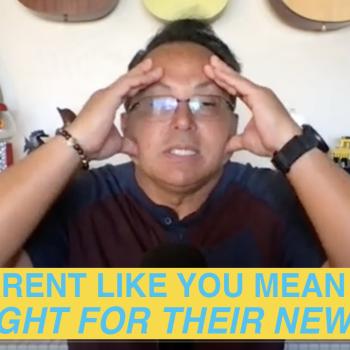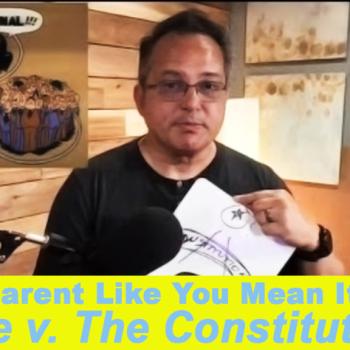Today, we’ll look at the second half of 1 Samuel chapter 2 and its applications to life today. Right off the bat, we see that young Samuel has been placed under the care of Israel’s priest Eli. Now, Eli already has a couple of sons, so why is Samuel allowed adoption into Eli’s family?
We see the answer to this question in 1 Samuel 2:11-12
11 Then Elkanah returned home to Ramah without Samuel. And the boy served the Lord by assisting Eli the priest.
12 Now the sons of Eli were scoundrels who had no respect for the Lord
You see, Eli’s sons were priestly leaders who served in the Tabernacle, but they were continually committing sexual immorality with unmarried women right there at the Tabernacle and they were extorting God’s people in order to acquire better things than they were entitled to. They would take portions of people’s sacrifices that were not rightly theirs to take and eat whatever they wanted instead of obeying God’s law regarding how sacrifices should be handled.
Now here’s the deal: God will replace bad leadership with good leadership. That’s actually an overarching theme of the entire Bible. To oversimplify, God replaced the bad leadership of Adam (mankind) with the good leadership of Jesus. We see this principle in a microcosm in 1 Samuel with young Samuel being brought in and eventually replacing the bad leadership of Hophni and Phinehas, Eli’s sons.
As we read through the chapter, we learn that Eli is accountable as well for the sins of his sons.
22 Now Eli was very old, but he was aware of what his sons were doing to the people of Israel. He knew, for instance, that his sons were seducing the young women who assisted at the entrance of the Tabernacle. 23 Eli said to them, “I have been hearing reports from all the people about the wicked things you are doing. Why do you keep sinning? 24 You must stop, my sons! The reports I hear among the Lord’s people are not good. 25 If someone sins against another person, God can mediate for the guilty party. But if someone sins against the Lord, who can intercede?” But Eli’s sons wouldn’t listen to their father, for the Lord was already planning to put them to death.
This introduces us to a difficult “sub-theme” that runs throughout the entire books of 1&2 Samuel: Fathers and Sons.
Eli has sons who refuse to do God’s will. Later on, we find David and Samuel’s sons fall prey to the same thing. Yet, in an interesting turn of events, Israel’s first king, Saul (who is wicked) has a son, Jonathan, who is completely righteous. So the theme that we see is in regards to fathers who have wicked sons and refuse to step in actively to stop their sons’ behavior.
That’s a hard pill to swallow.
In an age today when we believe that each individual is accountable for their own behaviors, it’s hard as dads to step in and actively stop the wrong behavior of our children. And when I say “actively”, I mean more than just a mention. We see in 1 Samuel 2 that Eli points out his sons’ sins to them, but that’s not enough.
A man needs another man in his life to help him see the vision for his life and to stop him when he is doing wrong.
But what about when the time comes when your son is old enough that he is “his own man” and you’re not able to step in with actions and stop his behavior? Well, in some circumstances, we think that we are without authority, but we actually do often have more options and avenues than we think. Eli thought that it was enough to verbally confront his sons and that’s the extent that he thought he had authority over them, when actually he could have deposed them of their job, but he refused to do so.
And that brings us to a heart issue. We don’t like to be shamed.
We don’t want to let other people know that there is something wrong in our family. We don’t want to look bad from the outside. And, as fathers, we have such a love for our sons that sometimes we mistake permission for love.
Additionally – and we will see David struggling with this later in the book – we often see our sons struggling with the same issues that we ourselves struggle with. And who are we to come in and punish or rebuke them from doing something when nobody stopped us from doing?
I know that many of us guys are ashamed of some of our behaviors that we got away with when we were young. We wish that we could go back in time and do things differently. And yet, there’s this gnawing feeling inside of us, that when our son commits the same behavior, that we have no moral authority to stop him because nobody stopped us.
If you find yourself in this situation – similar to Eli who had spoken to his sons about their behavior, but didn’t step in and actively put a stop to it – I want to encourage you. God knows that you’re not perfect. He knows the things that you regret doing when you were a young man. God knows the things that you struggle with even today. But know this: you don’t have to be perfect to stand in the gap for your son and help him stop wrong behavior. This doesn’t mean that you have to be heavy handed or go about things with false bravado. It simply means that you’re willing to put God’s understanding of the world first and your own emotions second. You have to put God’s rules first and you have to put your own love for your child second. And that’s a tremendously hard thing to do.
For more engaging and encouraging podcasts and videos, visit the E-Squared Media Network at www.e2medianetwork.com














